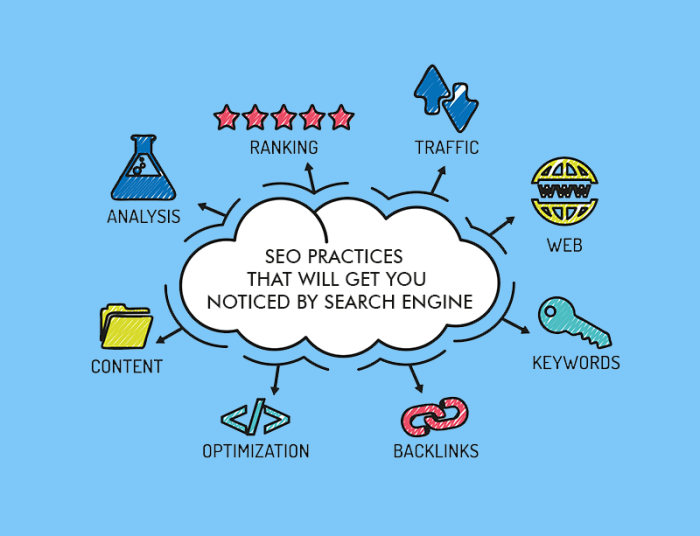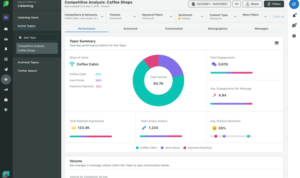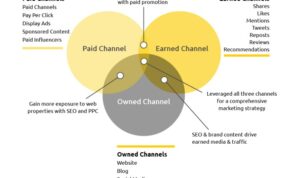SEO Best Practices – Best Practices sets the stage for dominating the digital landscape, uncovering the secrets to skyrocketing your website’s visibility like a boss. Get ready to dive deep into the world of with expert tips and tricks that will take your online presence to the next level.
From on-page strategies to off-page tactics and technical know-how, this guide will equip you with everything you need to conquer the search engine rankings and leave your competitors in the dust.
Importance of Best Practices
best practices are essential for maximizing website visibility and reaching a wider audience online. By following these practices, websites can improve their search engine rankings, drive more organic traffic, and ultimately enhance their online presence.
Improving Search Engine Rankings
Proper practices, such as optimizing s, meta tags, and creating high-quality content, can significantly boost a website’s ranking on search engine results pages. Search engines prioritize websites that adhere to guidelines, making it easier for users to find relevant information.
Impact of Neglecting Best Practices
Neglecting best practices can have a detrimental effect on website traffic and performance. Without proper optimization, websites may struggle to appear in search results, leading to decreased visibility and fewer visitors. This can ultimately hinder the growth and success of a website in the competitive online landscape.
On-Page Best Practices
When it comes to optimizing your website for search engines, on-page is essential for improving your visibility and ranking. By focusing on key strategies such as meta tags, headings, and URLs, you can enhance your site’s performance and attract more organic traffic.
Additionally, high-quality content, internal linking, and mobile responsiveness play a crucial role in on-page . Providing valuable and relevant content, interlinking related pages within your site, and ensuring a seamless user experience across different devices are all important factors to consider.
Optimizing Meta Tags, Headings, and URLs
- Optimize meta tags with relevant s to improve visibility in search results.
- Use proper headings (H1, H2, H3, etc.) to structure your content and make it easier for search engines to crawl.
- Create -friendly URLs that are descriptive and include target s for better indexing.
Importance of High-Quality Content, Internal Linking, and Mobile Responsiveness
- Produce unique and valuable content that meets the needs of your target audience and keeps them engaged.
- Implement internal linking to connect related pages within your site and improve navigation for both users and search engines.
- Ensure your website is mobile-friendly and responsive to provide a seamless experience on smartphones and tablets.
Tips for Optimizing Images, Improving Site Speed, and Enhancing User Experience
- Optimize images by using descriptive filenames, alt text, and reducing file sizes to improve page load times.
- Improve site speed by compressing images, leveraging browser caching, and minimizing HTTP requests.
- Enhance user experience by creating clear navigation, intuitive design, and fast-loading pages for better engagement.
Off-Page Best Practices: SEO Best Practices

In the world of , off-page strategies play a crucial role in boosting your website’s visibility and authority. One of the key elements of off-page is building a strong backlink profile.
Significance of Backlinks
Backlinks are like upvotes for your website in the eyes of search engines. They act as signals of trust and credibility, indicating that other websites find your content valuable. The more high-quality backlinks you have, the higher your website is likely to rank in search results.
- Focus on acquiring backlinks from authoritative websites in your niche to increase your website’s credibility.
- Avoid buying backlinks or engaging in link schemes, as search engines penalize such practices.
- Regularly monitor your backlink profile using tools like Ahrefs or Moz to identify any toxic or low-quality backlinks that may harm your efforts.
- Disavow any harmful backlinks to prevent them from impacting your website’s ranking.
Strategies for Building a Strong Backlink Profile
Building a strong backlink profile requires a combination of outreach, content creation, and relationship building.
- Create high-quality, shareable content that naturally attracts backlinks from other websites.
- Guest post on reputable websites within your industry to earn backlinks and increase your website’s visibility.
- Participate in online communities and forums to establish connections with influencers and webmasters who may link back to your website.
Tips for Enhancing Off-Page
Apart from backlinks, there are other strategies you can implement to enhance your off-page efforts.
Social media platforms can be powerful tools for promoting your content and attracting more visitors to your website.
- Share your content regularly on social media channels to engage with your audience and drive traffic to your website.
- Collaborate with influencers in your industry to reach a wider audience and gain valuable backlinks from their websites.
- Invest in content promotion strategies such as email marketing or paid advertising to increase your content’s reach and visibility.
Technical Best Practices

When it comes to technical , there are several key aspects that can help improve your website’s visibility on search engines. From website structure to SSL certificates, here are some best practices to consider:
Website Structure and Sitemaps
- Having a clear and organized website structure can make it easier for search engine crawlers to index your pages.
- Creating an XML sitemap can help search engines understand the structure of your site and find all your important pages.
SSL Certificates and Mobile-Friendliness
- Implementing an SSL certificate can improve your site’s security and boost your search engine rankings.
- Ensuring your website is mobile-friendly is crucial, as Google prioritizes mobile-friendly sites in search results.
Structured Data and Schema Markup, SEO Best Practices
- Utilizing structured data and schema markup can help search engines better understand the content on your website and display rich snippets in search results.
- Implementing canonical tags can help prevent duplicate content issues and consolidate link equity to the preferred version of a page.
- Properly implementing pagination can improve the user experience and help search engines crawl and index your content more efficiently.





